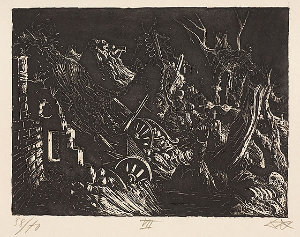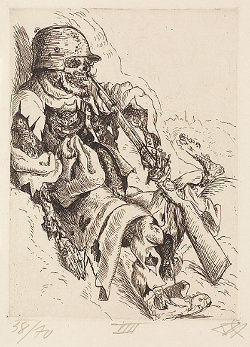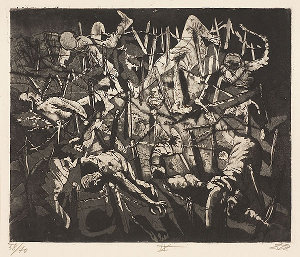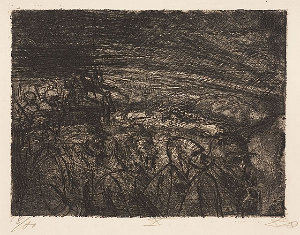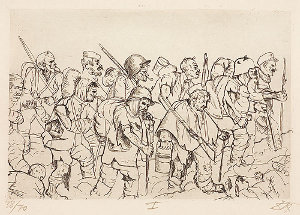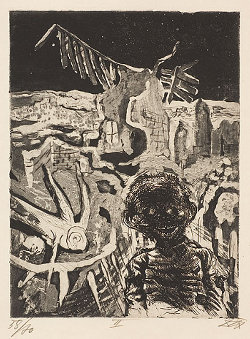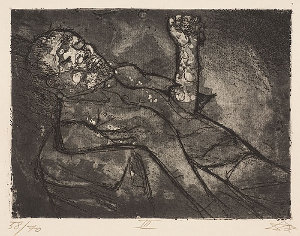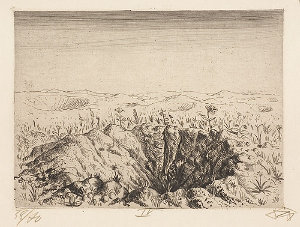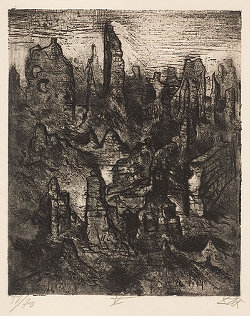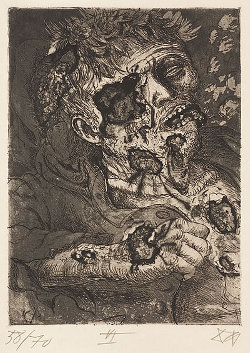Leuchtkugel erhellt die Monacu-ferme
Flare illuminates the farm at Monacu
Year: 1924
Description: Flares were launched in order to illuminated enemy troops. For Dix they revealed horrific images of human destruction.
Provenance: Der Krieg; #17
National Gallery of Austrailia
Canberra
Dead sentry in the trenches
Toter Sappenposten
Year: 1924
Description: Throughout this series, Dix presents a wide array of ways in which a soldier can meet his death. We've seen men ripped by bullets as they were tangled in barbed wire or buried alive as a trench collapsed. In this plate, a soldier remains posed in the exact position he held at the moment the sniper's bullet found its target.
Provenance: Der Krieg; #18
National Gallery of Austrailia
Canberra
Totentanz anno 17 (Hohe Toter Mann)
Dance of death 1917 - (Dead Man's Hill),
Year: 1924
Description: The idea was to cut through the enemy defenses with artillery in advance of the assault. The best laid plans of mice and men...
Provenance: Der Krieg; #19
National Gallery of Austrailia
Canberra
Die II. Kompanie wird heute Nacht abgelost
Second Company will be relieved tonight
Year: 1924
Description: Description
Provenance: Der Krieg; #20
National Gallery of Austrailia
Canberra
Battle weary troops retreating - Battle of the Somme
Abgekampfte Truppe geht zuruck - Sommeschlacht
Year: 1924
Description: Early in the battle, British troops advanced along a 25 mile front after a lengthy bombardment. The Germans retreated to reserve treches. The British advance soon stalled in the face of re-established machine gun positions. In the end, the Allies moved the front less than seven miles. Over a million men perished. Here Dix illustrates the results of the early British success.
Provenance: Der Krieg; #21
National Gallery of Austrailia
Canberra
Night-time encounter with a madman
Nachtliche Begegnung mit einem Irrsinnigen
Year: 1924
Description: A man never knew what he'd encounter on night patrol. Here Dix finds a madman who roams the rubble. It's not clear to which army he's assigned. His uniform is shredded along with his mind. The man represents an indirect threat. In this state, he can't harm an experienced soldier but he can draw the attention of those who can...
Provenance: Der Krieg; #22
The Minneapolis Institute of Arts
Minneapolis
Dead man in the mud
Toter im Schlamm
Year: 1924
Description: Mud defined a soldier's experience on the Western Front. He marched in it, slept in it, fought in it and often died in it. For the artist it offered rich textures which Dix captured nicely with aquatint.
Provenance: Der Krieg; #23
National Gallery of Austrailia
Canberra
Bomb-crater with flowers - Spring 1916
Granattrichter mit Blumen - Fruhling 1916
Year: 1924
Description: This is one of the few prints in the series to offer hope. The landscape remains marred but wild flowers start to grow. While humans are capable of great destruction, they are no match for the earth's ability to regenerate life.
Provenance: Der Krieg; #24
National Gallery of Austrailia
Canberra
The ruins of Langemarck
Die Trummer von Langemarck
Year: 1924
Description: During the Third Battle of Ypres, British troops captured Langemarck located near the strategic objective of Passchendaele. A German counter-offensive re-captured most of the ground around Langemarck. This lithograph likely depicts what was left of the town after Dix and the Germans returned. For their part, the British troops ultimately captured Passchendaele and declared victory. When the battle ended, little was changed on the Western From except the casualty lists, 310,000 on the Allied and 260,000 on the German side.
Provenance: Der Krieg; #25
National Gallery of Austrailia
Canberra
Dying soldier
Sterbender Soldat
Year: 1924
Description: His hair appears as a crown of thorns and life slips from his body. His body is torn to shreds and irreparable. The artist can only wait for this martyr to Imperial ambition to slip into oblivion.
Provenance: Der Krieg; #26
National Gallery of Austrailia
Canberra
